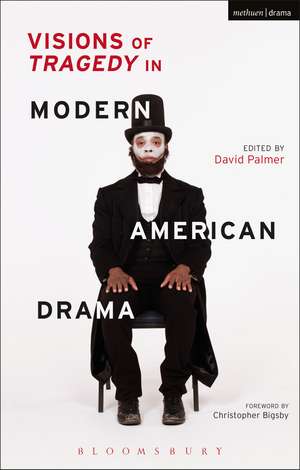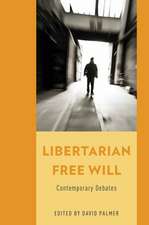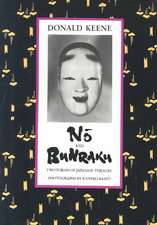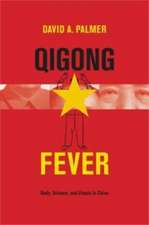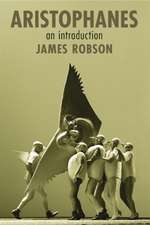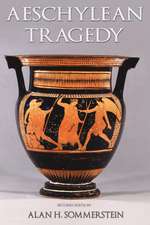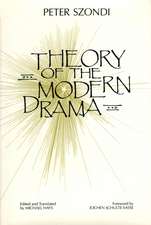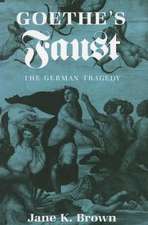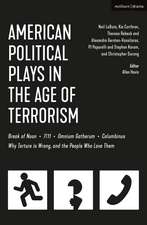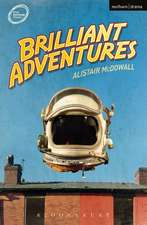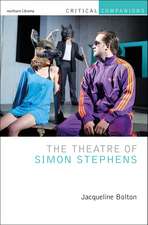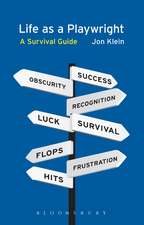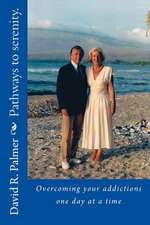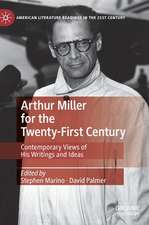Visions of Tragedy in Modern American Drama
Editat de David Palmeren Limba Engleză Paperback – 7 feb 2018
| Toate formatele și edițiile | Preț | Express |
|---|---|---|
| Paperback (1) | 172.64 lei 3-5 săpt. | |
| Bloomsbury Publishing – 7 feb 2018 | 172.64 lei 3-5 săpt. | |
| Hardback (1) | 538.92 lei 6-8 săpt. | |
| Bloomsbury Publishing – 7 feb 2018 | 538.92 lei 6-8 săpt. |
Preț: 172.64 lei
Preț vechi: 199.66 lei
-14% Nou
Puncte Express: 259
Preț estimativ în valută:
33.03€ • 34.42$ • 27.35£
33.03€ • 34.42$ • 27.35£
Carte disponibilă
Livrare economică 13-27 martie
Preluare comenzi: 021 569.72.76
Specificații
ISBN-13: 9781474276931
ISBN-10: 1474276938
Pagini: 272
Dimensiuni: 138 x 216 x 19 mm
Greutate: 0.36 kg
Editura: Bloomsbury Publishing
Colecția Methuen Drama
Locul publicării:London, United Kingdom
ISBN-10: 1474276938
Pagini: 272
Dimensiuni: 138 x 216 x 19 mm
Greutate: 0.36 kg
Editura: Bloomsbury Publishing
Colecția Methuen Drama
Locul publicării:London, United Kingdom
Caracteristici
Each essay provides key insights into the way a particular author envisioned and developed a conception of tragedy and uses those insights to elucidate and interpret broad themes throughout the author's oeuvre
Notă biografică
David Palmer taught philosophy and literature at the Massachusetts Maritime Academy, USA. His interest in ethics, philosophy of mind, and theories of the self led him to explore the plays of Samuel Beckett, Arthur Miller, and Eugene O'Neill. He is the president of the Arthur Miller Society and a board member of the Eugene O'Neill Society.
Cuprins
Notes on Contributors Forewordby Christopher Bigsby, University of East Anglia, UK Acknowledgements Introductionby David Palmer, Massachusetts Maritime Academy, USA 1. Eugene O'Neill (1888-1953)by Jeffery Kennedy, Arizona State University, USA 2. Susan Glaspell (1876-1948)by Sharon Friedman, New York University, USA 3. Langston Hughes (1902-1967)by Jonathan Shandell, Arcadia University, USA 4. Thornton Wilder (1897-1975)by Jackson R. Bryer, University of Maryland, USA 5. Lillian Hellman (1905-1984)by Anne Fletcher, Southern Illinois University, USA 6. Tennessee Williams (1911-1983)by Susan C. W. Abbotson, Rhode Island College, USA 7. Arthur Miller (1915-2005)by Stephen Marino, St. Francis College, USA 8. Edward Albee (1928-2016)by Natka Bianchini, Loyola University Maryland, USA 9. Lorraine Hansberry (1930-1965)by Deirdre Osborne, Goldsmiths, University of London, UK 10. Amiri Baraka (1934-2014)by Harvey Young, Northwestern University, USA 11. Adrienne Kennedy (1931-)by Werner Sollors, Harvard University, USA 12. August Wilson (1945-2005)by Sandra G. Shannon, Howard University, USA 13. Sam Shepard (1943-2017)by Shannon Blake Skelton, Kansas State University, USA 14. David Mamet (1947-)by Brenda Murphy, University of Connecticut, USA 15. Marsha Norman (1947-)by David Palmer, Massachusetts Maritime Academy, USA 16. Tony Kushner (1956-)by Claire Gleitman, Ithaca College, USA 17. Suzan-Lori Parks (1963-)by Soyica Diggs Colbert, Georgetown University, USA 18. American Theatre Since 1990by Toby Zinman, University of the Arts, USA Permissions Index
Recenzii
Tragedy has always been a hard sell in America. Ours is a nation that, as scholar Christopher Bigsby states in David Palmer's superlative anthology Visions of Tragedy in Modern American Drama, "was not a natural home for the tragic spirit, having been wed since its beginnings to a melioristic ideal." Nevertheless, Eugene O'Neill, the playwright heralded for transporting tragedy to the forefront of America's dramatic imagination, insisted that "truth, in theatre as in life, is eternally difficult just as the easy is the everlasting lie." Tragedy, O'Neill argued, was hard-earned by audiences bold enough to look deeply and critically at themselves and their society, and this was what made it worthwhile. Visions of Tragedy covers many hard "truths" about America and its inhabitants, as unleashed by the nation's greatest tragedians from O'Neill to our own time. Each of the essayists-an all-star cast in American drama studies-presents their argument in vibrant prose and with expert critical insight, never getting bogged down in academic jargon or doublespeak. Visions of Tragedy is destined to be a classic of American drama studies, clarifying and amplifying the diverse scope of tragic visions that have, for over a century, unflinchingly interrogated our shared national inheritance.
Visions of Tragedy features an impressive range of insightful essays on majorAmerican dramatists from O'Neill to Suzan-Lori Parks - several of which are focusedon the tragic implications of the American Dream.
Analyzing key works by the most significant American playwrights post-EugeneO'Neill, the eighteen essays contained in Visions of Tragedy in Modern AmericanDrama provide important insights into how the ancient concept of tragedy takes formin specifically American contexts. The authors productively explore how theseplaywrights have situated the American Dream and probed the particularly U.S.dynamics of race and class, while at the same time delving deeply into questions ofhuman suffering, fate, hubris, and complicity. In this way, the volume offers valuablenew readings of fundamental plays from the American dramatic canon, while alsoproposing evocative new understandings of tragedy. This is a critical anthology thatcertainly will benefit and inform students and scholars of American drama.
This is a well-designed introduction to major figures in the inherited canon of American drama... This collection of essays by various hands on canonical U.S. playwrights from the modern and contemporary repertory has the potential to be a useful guide for students who may be approaching the material for the first time. The range of authors is appropriate and the list of possible and likely contributors is more than sufficient to the task at hand.
I think this volume will fill a significant gap in the study of American drama and of tragedy, and will be welcomed by both teachers and students... As far as I know there is no book that addresses the subject of tragedy in American drama in any comprehensive way, and there is certainly no volume of essays that does so. While this volume does not pretend to be exhaustive, it covers sixteen significant American playwrights of the 20th and 21st centuries, including those who are best known for their work in tragedy. The concept of the volume is well conceived and thoroughly thought out. The fact that eight of the essays originated in a conference panel on American concepts of tragedy means that the core essays exist, and their ideas have been tested before a professional audience. The unifying concept of the volume, basing the discussion of the plays on the playwrights' own ideas about tragedy, provides a coherent overall point of view for the essays, while still providing the range and variety that comes with the individual ideas of the playwrights and the interpretation of the essay authors. I think a real strength is that this volume shows the concept of tragedy as a living and evolving thing being worked out by the playwrights in the theater at the same time that they are trying to articulate their understanding of it.
This is a new essay collection of dramatic criticism by top notch scholars that explores the concept of tragedy - how American dramatists, from Susan Glaspell to Suzan-Lori Parks, have developed a particularly American vision of tragedy. I would be very interested in seeing this work in print. The editor seems very knowledgeable and qualified; the contributing authors are brilliant; the focus/concept seems fascinating and worthwhile and original. The nature of tragedy is a question that has captured the imagination of theatre and drama lovers for millennia. It is also popular with audiences and artists. The playwrights included are popular with artists and scholars, so there should be significant interest in the book. The concept is brilliant; it seems original; I don't know of any other work with this purpose and scope. The concept of Tragedy - its nature and meaning , on an aesthetic and socio-psychological level, has fascinated human beings for millennia. It's a very worthwhile undertaking and I believe this could be a fascinating book. The scholars who have committed to writing chapters are also eminently qualified. Superb choices. The structure, the organization, the length of essays, all seem very well-conceived in terms of the books intended audience.
This is an enormously valuable study of the American theater by a group of veteranscholars whose essays are a delight to read. They remind us of the various ways inwhich American Drama stages the compelling public issues of a nation as reflectedthrough the private anxieties of the individual.
This readable collection of 18 essays takes on not only the work of mid-20th-century predominately male and white playwrights (O'Neill, Wilder, Williams, Miller, Albee, Mamet) but also recent feminist works (Glaspell, Hellman, Norman) and race-themed plays (Hughes, Hansberry, Baraka, Kennedy, Wilson, and Parks). Aimed at a classroom readership (Palmer suggests a chapter a week for survey courses), the book is meant to facilitate engagement with uniquely American conceptions of tragedy . Summing Up: Recommended.
Visions of Tragedy features an impressive range of insightful essays on majorAmerican dramatists from O'Neill to Suzan-Lori Parks - several of which are focusedon the tragic implications of the American Dream.
Analyzing key works by the most significant American playwrights post-EugeneO'Neill, the eighteen essays contained in Visions of Tragedy in Modern AmericanDrama provide important insights into how the ancient concept of tragedy takes formin specifically American contexts. The authors productively explore how theseplaywrights have situated the American Dream and probed the particularly U.S.dynamics of race and class, while at the same time delving deeply into questions ofhuman suffering, fate, hubris, and complicity. In this way, the volume offers valuablenew readings of fundamental plays from the American dramatic canon, while alsoproposing evocative new understandings of tragedy. This is a critical anthology thatcertainly will benefit and inform students and scholars of American drama.
This is a well-designed introduction to major figures in the inherited canon of American drama... This collection of essays by various hands on canonical U.S. playwrights from the modern and contemporary repertory has the potential to be a useful guide for students who may be approaching the material for the first time. The range of authors is appropriate and the list of possible and likely contributors is more than sufficient to the task at hand.
I think this volume will fill a significant gap in the study of American drama and of tragedy, and will be welcomed by both teachers and students... As far as I know there is no book that addresses the subject of tragedy in American drama in any comprehensive way, and there is certainly no volume of essays that does so. While this volume does not pretend to be exhaustive, it covers sixteen significant American playwrights of the 20th and 21st centuries, including those who are best known for their work in tragedy. The concept of the volume is well conceived and thoroughly thought out. The fact that eight of the essays originated in a conference panel on American concepts of tragedy means that the core essays exist, and their ideas have been tested before a professional audience. The unifying concept of the volume, basing the discussion of the plays on the playwrights' own ideas about tragedy, provides a coherent overall point of view for the essays, while still providing the range and variety that comes with the individual ideas of the playwrights and the interpretation of the essay authors. I think a real strength is that this volume shows the concept of tragedy as a living and evolving thing being worked out by the playwrights in the theater at the same time that they are trying to articulate their understanding of it.
This is a new essay collection of dramatic criticism by top notch scholars that explores the concept of tragedy - how American dramatists, from Susan Glaspell to Suzan-Lori Parks, have developed a particularly American vision of tragedy. I would be very interested in seeing this work in print. The editor seems very knowledgeable and qualified; the contributing authors are brilliant; the focus/concept seems fascinating and worthwhile and original. The nature of tragedy is a question that has captured the imagination of theatre and drama lovers for millennia. It is also popular with audiences and artists. The playwrights included are popular with artists and scholars, so there should be significant interest in the book. The concept is brilliant; it seems original; I don't know of any other work with this purpose and scope. The concept of Tragedy - its nature and meaning , on an aesthetic and socio-psychological level, has fascinated human beings for millennia. It's a very worthwhile undertaking and I believe this could be a fascinating book. The scholars who have committed to writing chapters are also eminently qualified. Superb choices. The structure, the organization, the length of essays, all seem very well-conceived in terms of the books intended audience.
This is an enormously valuable study of the American theater by a group of veteranscholars whose essays are a delight to read. They remind us of the various ways inwhich American Drama stages the compelling public issues of a nation as reflectedthrough the private anxieties of the individual.
This readable collection of 18 essays takes on not only the work of mid-20th-century predominately male and white playwrights (O'Neill, Wilder, Williams, Miller, Albee, Mamet) but also recent feminist works (Glaspell, Hellman, Norman) and race-themed plays (Hughes, Hansberry, Baraka, Kennedy, Wilson, and Parks). Aimed at a classroom readership (Palmer suggests a chapter a week for survey courses), the book is meant to facilitate engagement with uniquely American conceptions of tragedy . Summing Up: Recommended.
